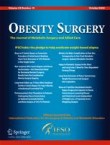
Abstract
Background
Complications including staple-line leakage and bleeding may occur after sleeve gastrectomy and Roux-en-Y gastric bypass. In this meta-analysis, the efficacy of fibrin sealant in strengthening the staple line and reducing complication risk after bariatric surgery was evaluated.
Methods
We searched PubMed, Embase, and Cochrane Library databases for randomized controlled trials (RCTs) published up to October 2020. Pooled estimates of the outcomes were computed using a random effects model. The primary outcomes were bleeding and leakage; secondary outcomes were gastric stricture, length of hospital stay, reoperation rate, and total operation time.
Results
In total, 9 RCTs including 2136 patients were reviewed. Our meta-analysis revealed that compared with controls, fibrin sealants decreased incidence of bleeding significantly (risk ratio [RR] = 0.42; 95% confidence interval [CI], 0.18–0.97), but did not demonstrate significant differences in reducing the incidence of leakage (RR = 0.62; 95% CI, 0.23–1.73), gastric stricture (RR = 1.16; 95% CI, 0.46–2.91), reoperation rate (RR = 0.85; CI, 0.14–5.14), or length of hospital stay (weighted mean difference = 0.62; 95% CI, − 0.31 to 1.55). Compared with oversewing, fibrin sealant use reduced the operation time; however, their efficacies in reducing the incidence of postoperative bleeding and leakage did not differ significantly.
Conclusions
Although applying fibrin sealants to the staple line in bariatric surgery may provide favorable results, but it may not reduce postoperative leakage and stricture incidence significantly. Nevertheless, the application of fibrin sealants as a method for reducing risks of complications after bariatric surgery warrant further investigation.



Δεν υπάρχουν σχόλια:
Δημοσίευση σχολίου
Σημείωση: Μόνο ένα μέλος αυτού του ιστολογίου μπορεί να αναρτήσει σχόλιο.